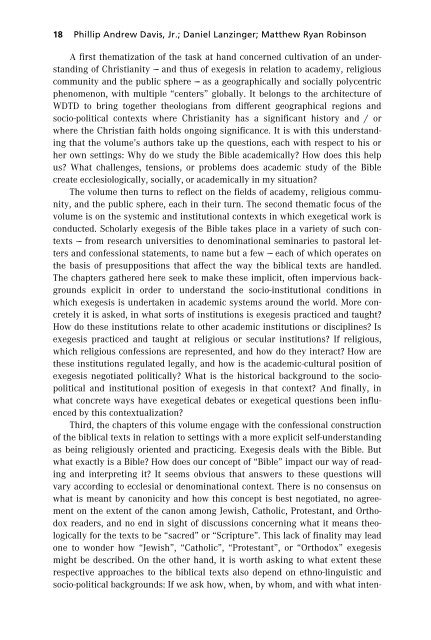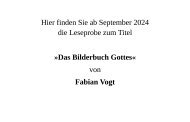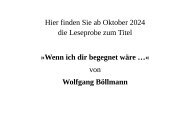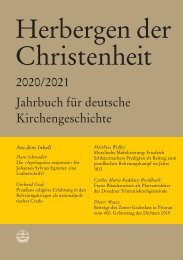Phillip A. Davis, Jr. | Daniel Lanzinger | Matthew Ryan Robinson (Eds.): What Does Theology Do, Actually? (Leseprobe)
You also want an ePaper? Increase the reach of your titles
YUMPU automatically turns print PDFs into web optimized ePapers that Google loves.
18<br />
<strong>Phillip</strong> Andrew <strong>Davis</strong>, <strong>Jr</strong>.; <strong>Daniel</strong> <strong>Lanzinger</strong>; <strong>Matthew</strong> <strong>Ryan</strong> <strong>Robinson</strong><br />
A first thematization of the task at hand concerned cultivation of an understanding<br />
of Christianity --- and thus of exegesis in relation to academy, religious<br />
community and the public sphere --- as a geographically and socially polycentric<br />
phenomenon, with multiple ‘‘centers’’ globally. It belongs to the architecture of<br />
WDTD to bring together theologians from different geographical regions and<br />
socio-political contexts where Christianity has a significant history and / or<br />
where the Christian faith holds ongoing significance. It is with this understanding<br />
that the volume’s authors take up the questions, each with respect to his or<br />
her own settings: Why do we study the Bible academically? How does this help<br />
us? <strong>What</strong> challenges, tensions, or problems does academic study of the Bible<br />
create ecclesiologically, socially, or academically in my situation?<br />
The volume then turns to reflect on the fields of academy, religious community,<br />
and the public sphere, each in their turn. The second thematic focus of the<br />
volume is on the systemic and institutional contexts in which exegetical work is<br />
conducted. Scholarly exegesis of the Bible takes place in a variety of such contexts<br />
--- from research universities to denominational seminaries to pastoral letters<br />
and confessional statements, to name but a few --- each of which operates on<br />
the basis of presuppositions that affect the way the biblical texts are handled.<br />
The chapters gathered here seek to make these implicit, often impervious backgrounds<br />
explicit in order to understand the socio-institutional conditions in<br />
which exegesis is undertaken in academic systems around the world. More concretely<br />
it is asked, in what sorts of institutions is exegesis practiced and taught?<br />
How do these institutions relate to other academic institutions or disciplines? Is<br />
exegesis practiced and taught at religious or secular institutions? If religious,<br />
which religious confessions are represented, and how do they interact? How are<br />
these institutions regulated legally, and how is the academic-cultural position of<br />
exegesis negotiated politically? <strong>What</strong> is the historical background to the sociopolitical<br />
and institutional position of exegesis in that context? And finally, in<br />
what concrete ways have exegetical debates or exegetical questions been influenced<br />
by this contextualization?<br />
Third, the chapters of this volume engage with the confessional construction<br />
of the biblical texts in relation to settings with a more explicit self-understanding<br />
as being religiously oriented and practicing. Exegesis deals with the Bible. But<br />
what exactly is a Bible? How does our concept of ‘‘Bible’’ impact our way of reading<br />
and interpreting it? It seems obvious that answers to these questions will<br />
vary according to ecclesial or denominational context. There is no consensus on<br />
what is meant by canonicity and how this concept is best negotiated, no agreement<br />
on the extent of the canon among Jewish, Catholic, Protestant, and Orthodox<br />
readers, and no end in sight of discussions concerning what it means theologically<br />
for the texts to be ‘‘sacred’’ or ‘‘Scripture’’. This lack of finality may lead<br />
one to wonder how ‘‘Jewish’’, ‘‘Catholic’’, ‘‘Protestant’’, or ‘‘Orthodox’’ exegesis<br />
might be described. On the other hand, it is worth asking to what extent these<br />
respective approaches to the biblical texts also depend on ethno-linguistic and<br />
socio-political backgrounds: If we ask how, when, by whom, and with what inten-
















